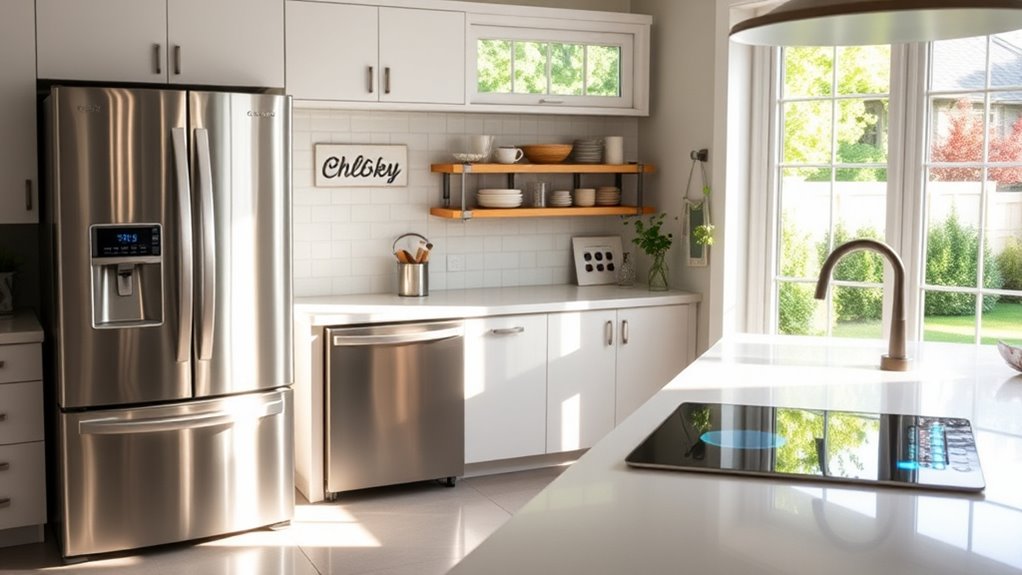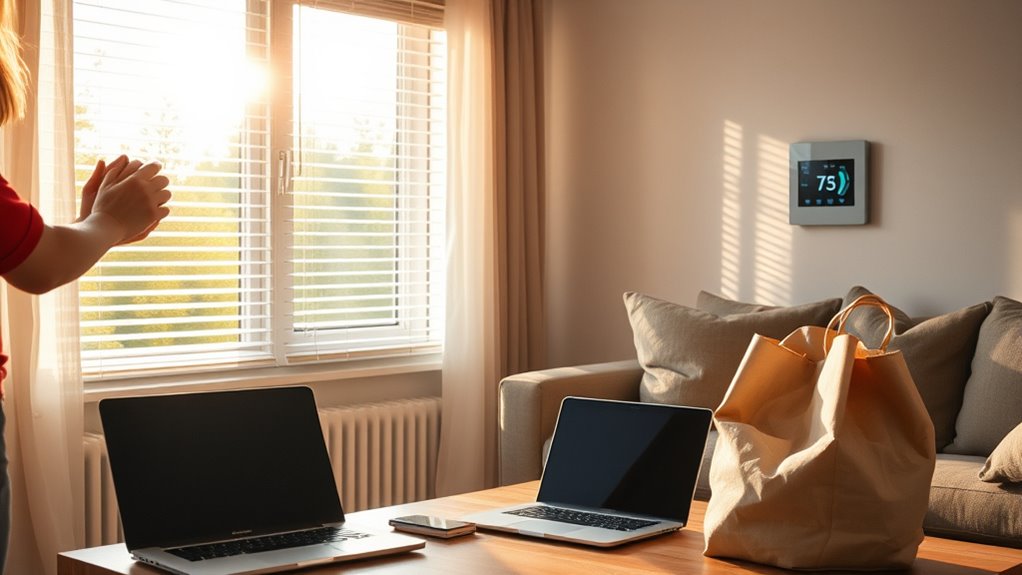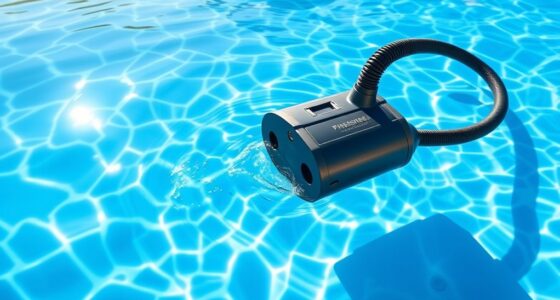To lower your utility bills, start by upgrading to energy-efficient appliances like ENERGY STAR-rated washers and refrigerators, and consider installing solar panels for renewable energy. Improve your home’s insulation by sealing leaks around windows, doors, and cracks to prevent heat loss. Adjust your daily habits by using smart thermostats to optimize heating and cooling, turning off unused electronics, and taking shorter showers. Keep exploring for more effective tips to make your home more energy-efficient and cost-savvy.
Key Takeaways
- Install ENERGY STAR-rated appliances and solar panels to reduce energy consumption and harness renewable power.
- Seal leaks and upgrade insulation to improve home efficiency and prevent heat transfer.
- Use smart thermostats and adjust settings to optimize heating and cooling based on occupancy.
- Maximize natural light and reduce electricity use by turning off unused lights and electronics.
- Hang clothes to dry and take shorter showers to conserve water and reduce energy used by water heaters.
Upgrade to Energy-Efficient Appliances

Upgrading to energy-efficient appliances is one of the most effective ways to lower your utility bills. Installing solar panels allows you to harness renewable energy, cutting down your reliance on grid power and reducing electricity costs. Pairing this with a smart thermostat setup ensures your heating and cooling systems operate only when needed, optimizing energy use. Modern appliances, like ENERGY STAR-rated washers, dryers, and refrigerators, consume less power while delivering the same performance. These upgrades not only save you money but also lessen your environmental impact. Incorporating wall organization systems can further enhance your home’s efficiency by reducing clutter and improving accessibility to energy-saving devices. By combining solar panel installation with smart thermostat setup and energy-efficient appliances, you create a smarter, more sustainable home that minimizes utility expenses over time. This proactive approach makes your home more efficient and budget-friendly.
Optimize Your Home’s Insulation and Sealing

Improving your home’s insulation and sealing gaps can substantially reduce heating and cooling costs. Start by upgrading your window insulation to prevent drafts and heat loss during winter or heat gain in summer. Use weatherstripping or plastic film kits to seal leaks around windows and doors. Applying caulking techniques to cracks and gaps in your walls, baseboards, and around window frames guarantees your home stays airtight. Focus on common problem areas like attic hatches, vents, and electrical outlets. Proper sealing keeps conditioned air inside and outside air out, reducing the workload on your HVAC system. Additionally, shower fixtures like low-flow showerheads can contribute to water and energy savings. Investing time in these simple updates can lead to significant savings on energy bills while making your home more comfortable year-round.
Adjust Daily Habits to Reduce Energy Consumption

Adjusting your daily habits can make a noticeable difference in your energy bills. Start by setting your smart thermostat adjustments to optimize comfort and efficiency, lowering the temperature when you’re asleep or away. Use daylight utilization by opening curtains during the day to warm your home naturally, reducing reliance on heating. Turn off lights and electronics when not in use, and avoid leaving devices on standby. Consider taking shorter showers to conserve hot water, which reduces energy used by your water heater. Additionally, hang clothes to dry instead of using the dryer whenever possible. Exploring energy-efficient appliances can further lower your utility bills. These simple changes, combined with smart thermostat adjustments and maximizing daylight, can substantially cut your energy consumption and save you money over time.
Frequently Asked Questions
How Can I Verify if My Appliances Are Energy-Efficient?
To verify if your appliances are energy-efficient, check their labels, especially the Energy Star certification. These labels indicate the appliance meets energy-saving standards set by the government. You can also look up the model number online to find detailed energy consumption information. Choosing appliances with the Energy Star label guarantees you’re using models designed to save energy, helping you reduce your utility bills and environmental impact.
What Are the Best Times to Run Appliances for Savings?
Imagine saving enough money to buy a small island! To do that, you should run your appliances during off-peak hours when energy demand drops dramatically. Avoid peak hours, usually late afternoons and evenings, because electricity costs skyrocket then. Shift chores to early mornings or late nights for off-peak savings. Not only will you cut costs, but you’ll also help reduce strain on the grid, making your savings more powerful!
How Often Should I Service My HVAC System?
You should schedule HVAC maintenance at least once a year to guarantee your system stays in top shape. Regular servicing helps improve system longevity and efficiency, preventing costly repairs down the line. If you use your HVAC heavily or experience extreme weather, consider biannual checkups—once in spring and once in fall. Staying proactive with maintenance keeps your system running smoothly and saves you money on energy bills.
Are Smart Thermostats Worth the Investment?
Smart thermostats are definitely worth considering because they offer features like easy scheduling, remote control, and energy monitoring that can save you money. While installation costs vary, many models are affordable and simple to set up. Plus, their smart features help optimize your heating and cooling, making your home more comfortable and efficient. If you want to lower utility bills and enjoy added convenience, investing in a smart thermostat is a smart choice.
Can Window Treatments Improve Energy Efficiency Year-Round?
Think of your home as a cozy cocoon, protecting you from the elements. Yes, window treatments can boost energy efficiency year-round. By adding window insulation and coatings, you can keep warmth inside during winter and block heat in summer. These treatments act like a shield, reducing drafts and heat transfer. You’ll save on energy bills and stay comfortable, no matter the season, making your home a true sanctuary.
Conclusion
By upgrading appliances, sealing leaks, and changing your habits, you’re shaping a more efficient home. Think of your energy use as a garden—tend it carefully, and it’ll flourish with less waste and expense. Small, smart changes act like watering cans, nourishing your savings while keeping your utility bills in check. With each step, you’re not just saving money, but cultivating a more sustainable, comfortable living space—your personal oasis of efficiency.









